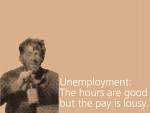Sunday, July 30, 2006
Tough US Welfare Reforms Challenges Leftwing Assumptions
 Occasionally, as a fairminded left of centre social scientist(as this is how I like to think of myself), I've encountered evidence which has challenged my basic assumptions. The leader in the Economist and the longer related article inside, did just that. It concerns the step change in US welfare back in 1995 whereby time limits were placed on entitlement to welfare payments. I can remember feeling indignation that as those cruel limits expired thousands of poor people would be condemned to destitution and grimly waited for news of such an acopalypse to arrive from over the Atlantic.
Occasionally, as a fairminded left of centre social scientist(as this is how I like to think of myself), I've encountered evidence which has challenged my basic assumptions. The leader in the Economist and the longer related article inside, did just that. It concerns the step change in US welfare back in 1995 whereby time limits were placed on entitlement to welfare payments. I can remember feeling indignation that as those cruel limits expired thousands of poor people would be condemned to destitution and grimly waited for news of such an acopalypse to arrive from over the Atlantic. Well, news has arrived, but it's not quite as I expected. Welfare rolls have actually fallen from 5 million to 2- millions of those on welfare have found work and poverty has fallen. Studies show that a strong economy has helped with the job finding but 'the main reason for the steep decline in caseloads is the reform itself'. Moreover, fewer people now walk through the door requiring welfare assistance. Most of the jobs taken up are poorly paid, as one might expect, but overall, former claimants are better off than they were on welfare.
Helping the reforms to work are incentives now familiar to the UK like tax credits for low earners and child care assistance, especially helpful for single mothers. Other countries like Denmark and Holland have introduced similar measures and we are told France and Germany are thinking about doing the same. If this shift from 'entitlement to conditionality' really does work as well as these reports suggest, then default welfare thinking on the left will have to be seriously re-examined.
Comments:
<< Home
I read it too, and felt much the same way as you. There's been very little reaction to this, which is a shame.
Post a Comment
<< Home




